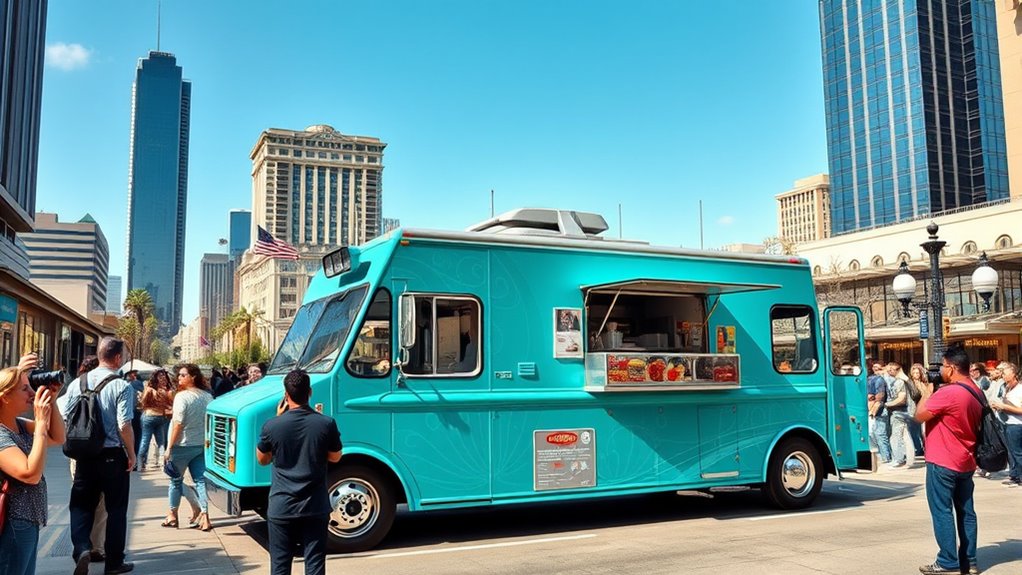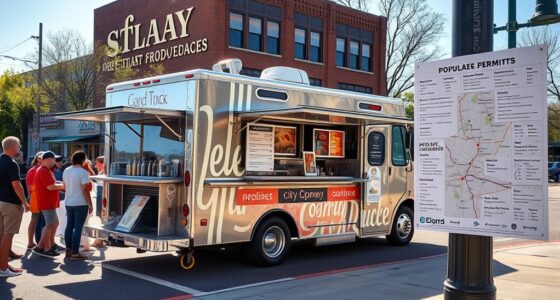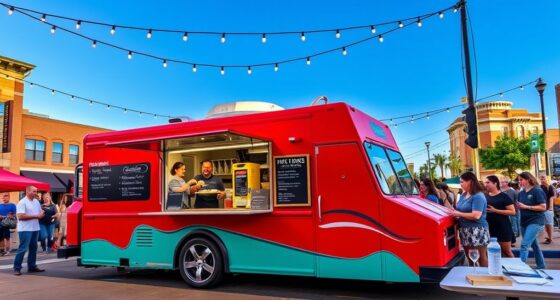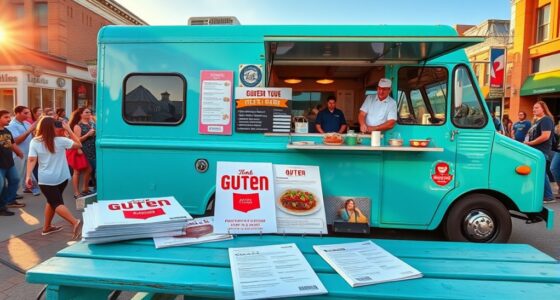To open a food truck in Houston, you’ll need permits like a Food Dealer’s/Handler’s Permit, MFU Permit, and possibly a Fire Marshal Permit, plus vehicle registration and licenses. Startup costs typically range from $35,000 to $95,000 depending on your truck and equipment, with monthly expenses around $1,000+. Choose high-traffic locations such as parks and busy districts, and craft a menu that showcases Houston’s diverse flavors. Effective marketing through social media, events, and data-driven strategies can boost your success—keeping all these factors in mind will guide you toward a thriving food truck business.
Key Takeaways
- Secure required permits including Houston Food Dealer’s Permit, health certifications, fire safety, and vehicle registration.
- Initial startup costs range from $35,000 to $95,000, covering truck, equipment, permits, and marketing.
- Prime locations include high-traffic parks, shopping districts, transit hubs, and event venues for maximum exposure.
- Develop a diverse menu featuring Houston’s multicultural cuisines, bold flavors, and dietary options to attract broad customers.
- Use social media, loyalty programs, and event participation to effectively market and grow your food truck business.
Navigating Permits and Licenses in Houston
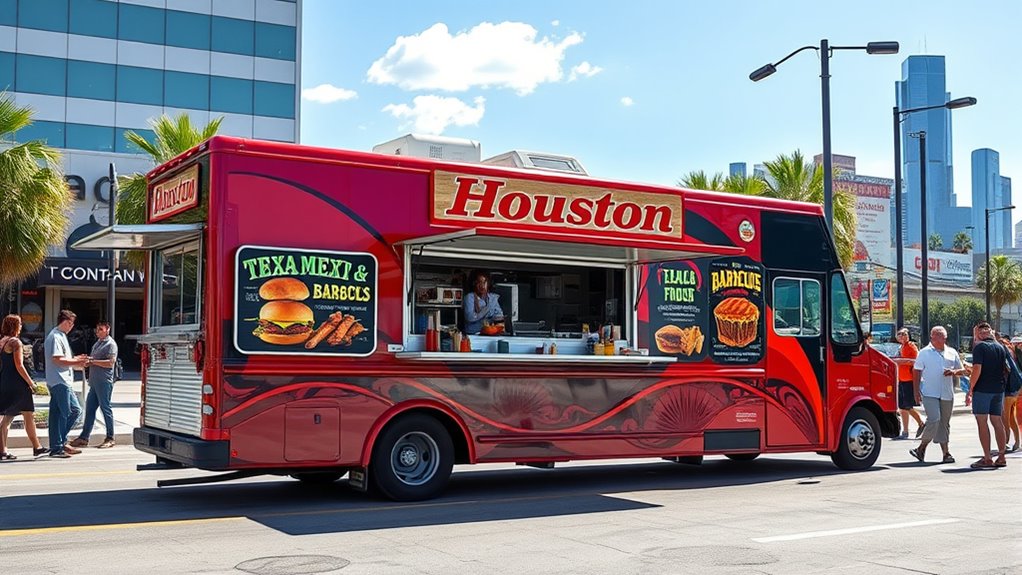
Are you aware of all the permits and licenses required to operate a food truck in Houston? To start, you need a Food Dealer’s/Handler’s Permit from the Houston Health Department and a Mobile Food Unit (MFU) Permit from Harris County Public Health. Both require inspections, plan reviews, and annual renewals. You’ll also need a health permit and a Certified Food Manager Certificate for at least one responsible person, plus food handler certificates for all employees. Fire safety is vital—obtain a Houston Fire Marshal Permit and install an automatic fire extinguishing system. Your vehicle must be registered with the Texas Department of Motor Vehicles, and a commercial license might be necessary if your truck exceeds 26,000 pounds. Don’t forget general liability insurance and, if serving alcohol, a TABC permit. Additionally, Food and Health Permits are mandatory, and compliance with health and sanitation standards is essential to ensure legal operation and avoid fines. Ensuring compliance with local regulations often involves understanding regulatory requirements, which can vary based on specific city or county ordinances.
Estimating Startup and Operating Expenses
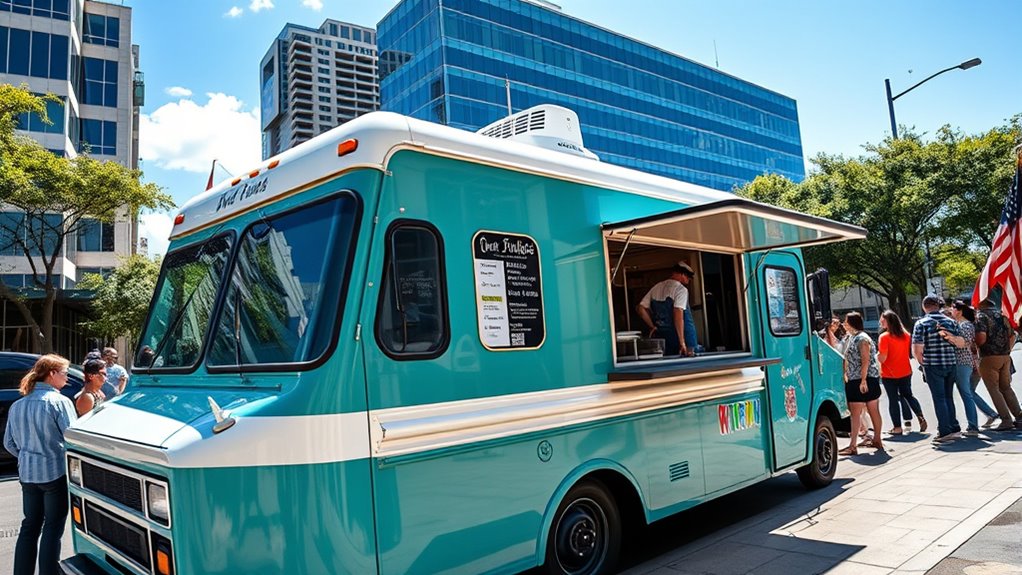
Estimating your startup and ongoing expenses is a key step in launching a successful food truck operation in Houston. Your initial costs will likely include purchasing or leasing a truck, which ranges from $35,000 to $95,000 depending on size and condition. Equipping it with appliances like fryers, refrigerators, and griddles can add another $20,000 to $40,000. You’ll need $2,000 to $4,500 for initial inventory, plus $2,500 to $15,000 for custom branding and $1,000 to $3,000 for POS systems. Permits, licenses, and insurance may total around $3,000 upfront. It’s important to research specific permits and licenses required for food trucks in Houston to ensure compliance. Monthly expenses, including fuel, maintenance, wages, and utilities, can reach $1,000 or more. Budget for marketing efforts, which typically cost $2,700 to $7,200 annually, to build your brand. Start-up costs vary depending on the size of the truck and equipment choices.
Selecting Prime Locations for Your Food Truck
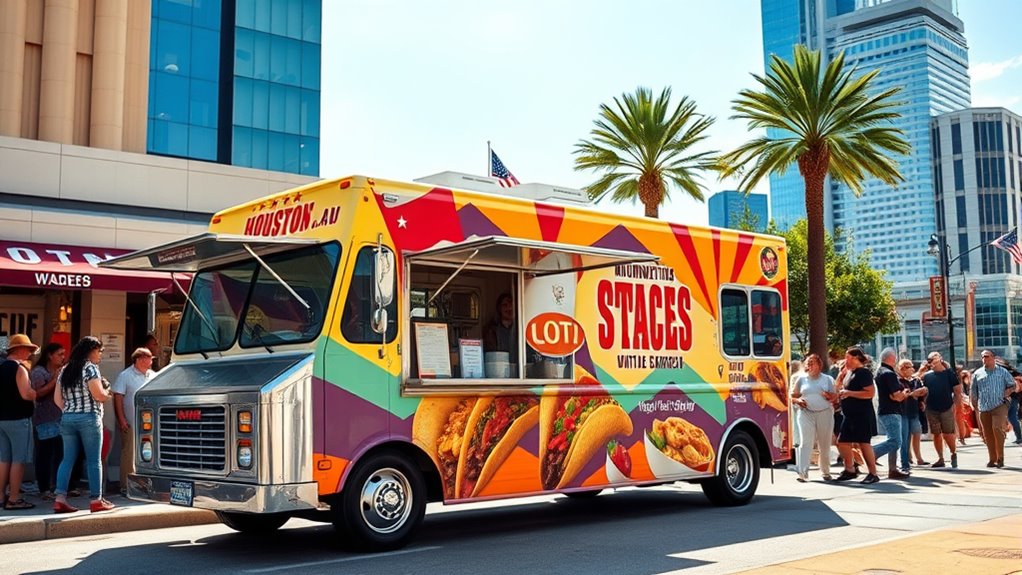
Choosing the right location is essential for your food truck’s success in Houston, as it directly influences customer flow and sales. High-traffic food truck parks like 4501 Almeda Food Truck Park and Food Street Park draw diverse crowds and host regular events, boosting visibility. Parks may charge more, but they also bring higher customer volume, making them worthwhile. You should also consider spots near shopping districts, transit hubs, or entertainment venues for impulse buys and repeat business. Urban and suburban settings help target different demographics. Additionally, ensuring your location is mobile responsive and easy to access can further enhance customer satisfaction and repeat visits.
Crafting a Menu That Appeals to Houston Diners
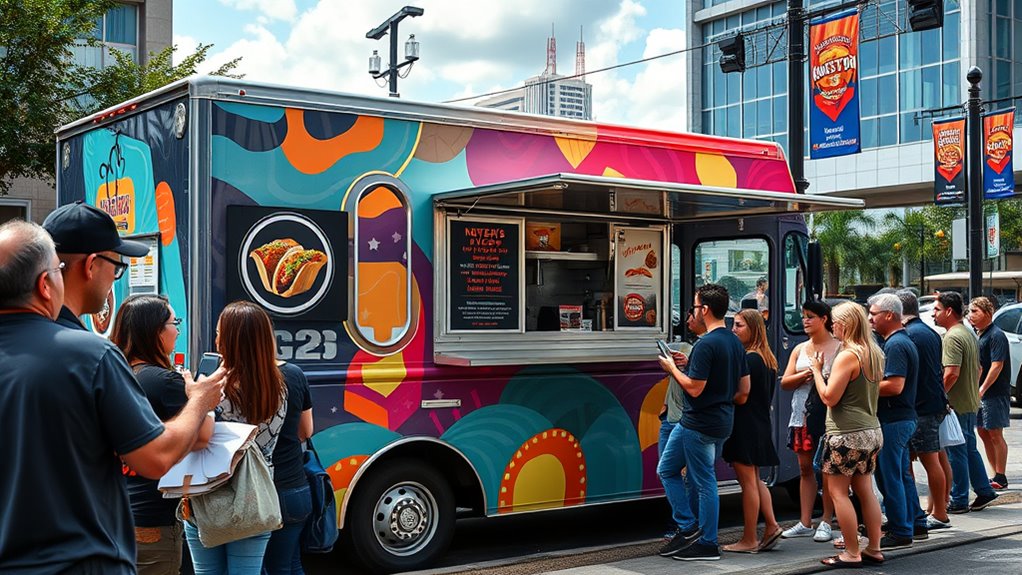
To craft a menu that truly resonates with Houston diners, you need to embrace the city’s rich multicultural culinary landscape. Houston’s food scene thrives on diverse influences like Latin American, Tex-Mex, Korean-Mexican fusion, and Cajun flavors. Bold, spicy, and flavorful dishes, such as Korean BBQ tacos or loaded fries, are especially popular. Incorporate authentic ethnic street foods and creative fusion options to meet local demand. Consider offering comfort foods with a twist—quesadillas with kimchi or gourmet burgers with unique sauces—to attract a wide audience. Don’t forget dietary options like gluten-free, vegan, and dairy-free dishes, which are increasingly important. By blending regional ingredients and vibrant flavors, your menu will stand out and appeal to Houston’s diverse, adventurous palate. Exploring cultural fusion can help you develop innovative dishes that celebrate Houston’s eclectic taste preferences.
Effective Marketing Strategies to Grow Your Food Truck Business
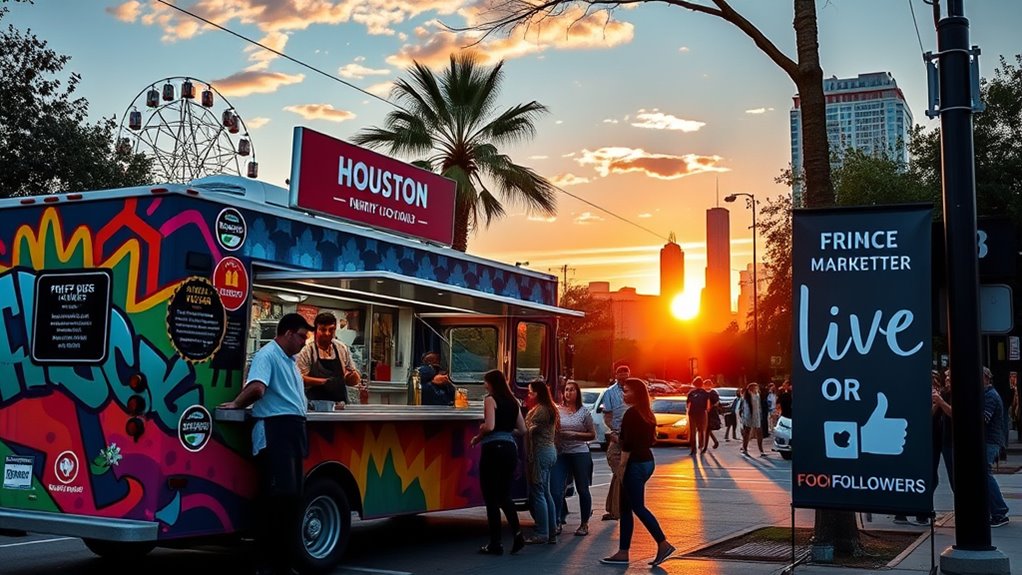
Effective marketing is key to expanding your food truck’s reach and attracting a steady stream of customers in Houston’s competitive scene. To succeed, leverage social media platforms like Facebook, Instagram, TikTok, and Snapchat to boost visibility and engagement. Over 50% of food trucks have implemented loyalty programs, resulting in a 30% increase in repeat visits, highlighting the importance of building customer retention through targeted rewards and incentives. Here are four strategies to grow your business: 1. Use social media ads, which help 40% of customers discover trucks for the first time. 2. Participate in local events, festivals, and markets to increase brand exposure and gather customer data. 3. Implement loyalty programs, resulting in a 30% increase in repeat visits, and personalize rewards to enhance satisfaction. 4. Utilize data analytics and GPS technology to optimize locations, operating times, and targeted promotions. Incorporating space optimization techniques can further streamline your operations and improve customer experience. Combining these tactics creates a powerful marketing mix to attract new customers and foster loyalty.
Frequently Asked Questions
How Long Does It Take to Get All Necessary Permits in Houston?
It usually takes you about 3 to 6 weeks to get all your permits in Houston, assuming everything’s in order. You’ll need to schedule inspections, pass health, fire, and other safety checks, and coordinate with multiple agencies. Keep in mind, delays happen if applications are incomplete or inspections need re-scheduling. To avoid setbacks, submit thorough paperwork and consider expedited options if available.
Are There Specific Noise Regulations for Food Trucks in Houston?
Imagine your food truck as a lively voice in Houston’s bustling scene, but it must sing within certain noise boundaries. You’re required to get permits for amplified sound, adhering to strict decibel limits—75 dB during the day, dropping to 58 dB at night near homes. Violating these rules risks hefty fines and shutdowns, so you need to stay in tune with Houston’s evolving noise regulations to keep your crowd, and community, happy.
What’s the Best Way to Find Available Food Truck Parking Spots?
You should start by exploring online platforms like FoodParks.io, which list available food truck parking spots in Houston, including details on costs and amenities. Check out public listings near busy areas or high-traffic venues, and consider industrial lots or commercial parking lots for flexible options. Additionally, contact local food truck parks and event venues to find exclusive parking opportunities, ensuring you get the best spots to attract customers and grow your business.
How Do I Handle Health Inspections and Maintain Compliance?
Handling health inspections is like preparing for a test—you need to stay consistently ready. You must schedule annual inspections, keep documentation like food safety plans and logs, and confirm your staff is trained and certified. Address violations promptly, maintain sanitation, temperature control, and proper waste disposal. By staying proactive and organized, you’ll keep your mobile unit compliant, avoiding penalties and ensuring customer safety.
Are There Grants or Financial Assistance Options for Houston Food Truck Startups?
You’ll find plenty of grants and financial assistance options for Houston food truck startups. Programs like LiftFund and PeopleFund offer low-interest loans, while Harris Hub provides grants and training. Local initiatives such as the Houston Open for Business Program and Santander Bank’s grants support diverse-owned businesses. Industry-specific grants like the Culinary Grant Program also exist. Check eligibility requirements and application deadlines to take advantage of these resources and fund your food truck venture.
Conclusion
Starting a food truck in Houston is like planting a seed—you’ll need the right permits, a tasty menu, and smart marketing to help it grow. By carefully choosing your location and managing costs, you’ll set yourself up for success. Keep your passion fueled and your goals clear. With dedication, your food truck can become as vibrant and inviting as Houston’s lively streets, serving up delicious experiences that keep customers coming back for more.
